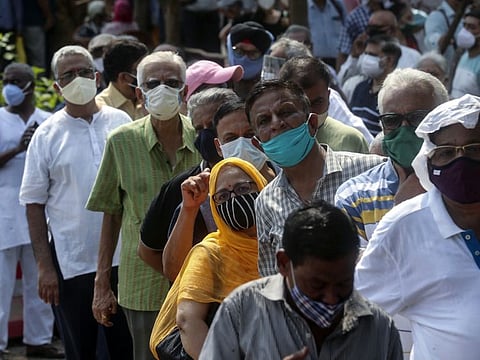Unicef and DP World send critical supplies to help India fight COVID-19 surge
Two million face shields and 200,000 surgical masks part of the medical consignment

Also In This Package
Dubai: With the help of end-to-end logistics support from DP World, Dubai, the United Nation’s Children’s Fund (Unicef) has sent additional critical life-saving supplies to India, including two million face shields and 200,000 surgical masks. The equipment was dispatched from Unicef’s warehouse in Dubai to New Delhi to help India battle a deadly ‘second wave’ of COVID-19. It is part of the global partnership between DP World and Unicef, which offers worldwide access to logistical services, including ports, rail, trucking and warehousing, free of charge.
Helping India to help the world battle COVID-19
Henrietta Fore, the Unicef executive director, said: “The tragic situation in India should raise alarm bells for all of us. Unless the world steps up and helps India now, there will be reverberations across the region and the world in terms of virus-related deaths, virus mutations and supply delays. The support of DP World and all our other partners has never been more critical.”
Sultan Ahmed bin Sulayem, Group Chairman and CEO, DP World, said: “DP World partnered with Unicef because dealing with the COVID-19 pandemic is humanity’s biggest logistics challenge in living memory. This emergency shipment of medical supplies is just one of many operations DP World will be supporting worldwide. The UAE and India have strong ties, and we stand by India through this devastating pandemic.”
UNICEF and partners are mobilising efforts to keep children and their families safe and healthy. UNICEF has provided oxygen concentrators and other critically needed emergency equipment to support the immediate response, while also supporting resilience-building against recurrent shocks and stresses to the health system that leave children and their families at risk.
Unicef has supplied 85 COVID-19 testing machines, which form a crucial part of Government of India’s response to the pandemic. Additionally, Unicef is supporting the procurement and installation of 25 oxygen plants for hospitals in the Northeast of India and in the state of Maharashtra, and the installation of more than 70 thermal scanners at various ports of entry in India.
Combating the pandemic with proper education of masses
Since the start of the pandemic, Unicef has been working with the government and partners in India to help stop the spread of COVID-19, sharing information with more than 660 million people on how to stay safe from coronavirus. Unicef has consistently worked to counter misinformation and promote COVID-19 protective practices, including wearing of masks, maintaining physical distancing and handwashing. New multimedia content is produced weekly in multiple languages for broadcast on digital channels and media, especially at the state level.
Currently, Unicef needs $21 million for the urgent delivery of additional testing equipment, supplies and oxygen products to India, and more than $50 million (Dh184 million) for lifesaving COVID-19 interventions across sectors.
Sign up for the Daily Briefing
Get the latest news and updates straight to your inbox








